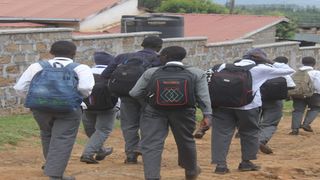
Molo Academy Secondary School students leave the school premises after the institution was closed indefinitely on November 1, 2021.
| John Njoroge | Nation Media GroupEducation
Premium
School heads blame student unrest on crash programme
A demanding crash programme has pushed secondary school students to the edge, resulting in a wave of unrest across the country.
School heads have called for a half-term break to ease the pressure brought about by the schedule introduced to make up for the time lost during the 10-month closure of schools last year. Whereas other terms have breaks, this doesn’t have one.
“Children have a tendency of asking for certain things in certain ways. We shouldn’t wait for other schools to be burnt down before we approve a break.
“We had not envisaged this, but when you see the escalation even in schools with no such a history, there’s a problem. Such a wave can become contagious,” said the chairperson of the Kenya Secondary Schools Heads Association (Kessha), Mr Kahi Indimuli.
Chavakali incident
“We’ve written to the Ministry of Education, requesting a break because it’s necessary based on the information we’re getting from our members,” he told the Nation.
Mr Indimuli called for resumption of co-curricular activities, such as sports, drama and music, which were suspended when schools reopened as one of the measures to stop the spread of Covid-19.
“We forgot that we have students who have a lot of energy and they look forward to participating in these events,” he said.
A disturbing video of girls jumping from the second floor of a dormitory to escape a fire as smoke billowed out of the windows captured the worrying trend that has been reported in more than 20 institutions.
The incident happened on Sunday evening at Buru Buru Girls’ High in Nairobi County. The cause of the fire has not yet been established and the school was closed.
Another dormitory caught fire at Chavakali High School in Vihiga County, in what has become almost a daily occurrence. Yesterday morning, another fire gutted a dormitory at Gendia Boys High in Homa Bay County, while Molo Academy in Nakuru was closed indefinitely following student unrest. On the same day, 24 learners from two schools in Nyeri were arraigned on charges of arson and/or possession of drugs.
The wave of student unrest has left in its wake destruction worth millions of shillings as parents worry about their children.
“We’re concerned for their safety. Many dormitories don’t have adequate security and are easily accessible, even by outsiders.
Let’s secure the dorms. Why deploy guards at the gate and not at the dorms?” posed Mr Nicholas Maiyo, the national chairperson of the parents’ association.
He added that the crash programme might have a negative effect on discipline.
The secretary-general of the Kenya Union of Post-Primary Education Teachers (Kuppet), Mr Akelo Misori, said schools face numerous problems.
He singled out over-enrolment in boarding schools as a possible cause of disciplinary issues.
“Are boarding schools still relevant? We’ve insisted on boarding schools but failed to provide sufficient infrastructure,” he told the Nation.
Mr Misori observed that the 100 per cent transition policy, although commendable, has not been matched with infrastructure expansion.
“Schools are congested. Teachers don’t even know their students and in such a case, it’s difficult to monitor their discipline. You can’t have peace when they queue to have lunch, use the toilet and even to shower,” he said.
Drug abuse
The chairperson of the Education and Research Committee of the National Assembly, Ms Florence Mutua, called for regular testing of students suspected of drug abuse. She also called for a progressive reduction of boarding schools to allow parents to have more time with their children.
Ms Mutua advised schools to install closed-circuit television (CCTV) and smoke detectors to hasten response to fires. She asked the government to disburse capitation funds to schools on time to provide for essential services.
Other schools affected by unrest last month include Dr Krapf Memorial (Kilifi), St Peter’s Abwao Secondary (Migori), Sigalame Boys High (Busia), Kanjuri High (Nyeri), St Ignatius Mukumu Boys Secondary (Kakamega) and Keveye Girls High (Vihiga).
In January, the Directorate of Criminal Investigations said it would collect and store information on students involved in criminal conduct.
Among the offences the DCI listed for criminal profiling are armed and violent demonstrations, arson, drugs, cyber-bullying, assault and drunkenness.
“This will be a permanent criminal mark that will bar many students from achieving their goals, as no employer of worth will dare employ such characters,” the agency said at the time.
Education Cabinet Secretary George Magoha also directed that students who destroy school property be surcharged.
He faced backlash and accolades in equal measure after toying with the idea of reintroducing corporal punishment, which was outlawed by the Children’s Act.
Meanwhile, a student died in a dormitory fire at Amasago Boys Secondary in Kisii County yesterday. The fire started around 3.30am and it also destroyed property of unknown value.
Worried parents arrived later in the day, but they were stopped from leaving the compound with their children. When the Nation team arrived at the school, personal effects of students were strewn all over the compound.





